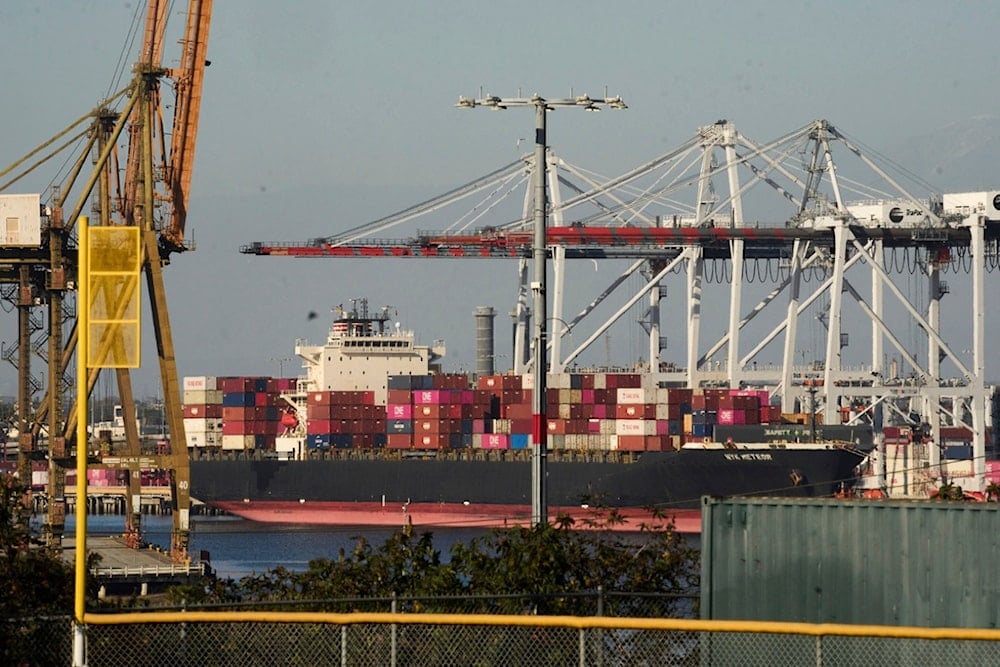China, US move closer to trade understanding ahead of leaders' meeting
China and the United States reached a preliminary trade consensus in Malaysia following weeks of escalating tariff threats.
-

FILE - The NYK Meteor container ship is moored at the Port of Los Angeles on April 9, 2025, in Los Angeles (AP Photo/Damian Dovarganes, File)
Chinese and American negotiators have made progress toward easing trade tensions, with both sides agreeing on a preliminary framework just days before a planned meeting between US President Donald Trump and his Chinese counterpart Xi Jinping.
Speaking in Malaysia on Sunday, China’s Vice Minister of Commerce and chief trade negotiator Li Chenggang said the discussions were productive and that both sides had shown willingness to bridge differences.
"China and the US constructively discussed these... ways to properly address issues both sides are concerned about and reached a preliminary consensus," Li stated.
Officials from Beijing and Washington held two days of talks in Malaysia, concluding Sunday. The meetings were part of broader diplomatic efforts to stabilize the world’s two largest economies before Trump and Xi meet later this week in South Korea.
Trade War
The renewed momentum follows months of escalating economic friction between Washington and Beijing, driven by competing tariff threats, new export controls, and heightened scrutiny of existing trade commitments. On October 24, the United States Trade Representative (USTR) launched a Section 301 investigation into China’s alleged violations of the 2020 Phase One Trade Agreement, reviving tensions over Beijing’s purchase pledges and intellectual property reforms. The move signaled Washington’s renewed willingness to confront what it calls "unfair trade practices" even as both sides sought dialogue.
The following day, officials led by US Treasury Secretary Scott Bessent and Chinese Vice Premier He Lifeng met in Kuala Lumpur on the sidelines of the ASEAN summit, in what both delegations later described as "very constructive" talks. The meetings came amid growing concern that a tariff escalation, including Trump’s threat to impose a 100% duty on Chinese imports by November 1, could reignite a full-blown trade war.
China, for its part, had announced that new export controls on rare-earth elements, lithium batteries, and graphite anodes would take effect on November 8, measures seen as a counterweight to US restrictions targeting Chinese tech sectors. The standoff rattled global markets and key industries, particularly US agriculture and China’s manufacturing supply chains, prompting both governments to seek a path toward de-escalation.
Strategic Timing
Diplomats say the talks in Kuala Lumpur were strategically timed to produce a tangible outcome before the Trump-Xi summit. By narrowing discussions to specific and manageable issues, such as tariff rollbacks, agricultural trade, and supply-chain cooperation, negotiators avoided the more entrenched disputes over subsidies, market access, and state-owned enterprises. The ASEAN setting provided a neutral venue conducive to constructive dialogue.
The negotiations also followed a phone conversation between Trump and Xi, which both leaders described as "productive." Chinese media quoted Xi as emphasizing the need to "value peace and build a future based on historical memory," while Trump said they had made progress on trade, fentanyl cooperation, the TikTok deal, and even the war in Ukraine, signaling a broader willingness to mend strained ties.
Mutual Incentives
Political considerations also played a role. For Trump, tangible progress on trade offered a domestic win amid slowing economic growth and rising election-year pressures. For Beijing, the talks provided a chance to project stability and reassure global investors as its export sector faces headwinds. Both capitals, therefore, had strong incentives to frame the outcome as a "preliminary consensus," a flexible term that suggests movement without forcing either side into visible concessions.
Still, tensions remain. Earlier this month, Beijing announced sanctions on five US-based subsidiaries of South Korea’s Hanwha Ocean, a shipbuilder linked to Washington’s "Make American Shipbuilding Great Again" (Masga) initiative. The sanctions, retaliation for recent US port fees targeting Chinese vessels, underscored Beijing’s readiness to counter what it views as US containment efforts in Asia, even as trade channels reopen.
Read more: China doubles down on tech self-reliance amid global tensions: FT

 4 Min Read
4 Min Read










